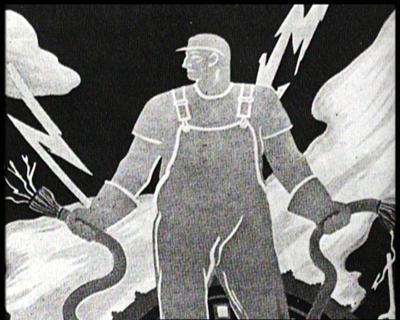
Been out for a bit now, but for those interested, read Jameson's piece on Alexander Kluge's new behemoth and get excited for the partial resurrection of Eisenstein. We'll do a proper screening of this in the fall, when we can convince one of our German proficients to loudly spot-translate over the whole thing.
That said, while the sense of "ideological antiquity" drawn out by Jameson (via Kluge's title) is a solid reminder to our rhetorical touchpoints (and the sometimes hidden models against which all being-not-classical is measured), it rather misses what I see as the vital point. For there is indeed the future work - and the work toward a future - that "demands the constitution of an antiquity appropriate to it." But more than that, there is the fact of the near-antiquity always foisted onto us, always reinscribing what we've lived through as belonging to another time, another world "unthinkable" now. In other words,the tumbling of the Berlin Wall, nearing only its 20 year anniversary, marks a sudden antiquation of our recent past. You can't go back, you must go on from here...

What late capitalism has proved itself remarkable at is the uncanny speed of its outmoding and declaring dead and gone. Not via the Futurist and Taylorist fantasies of a world revved up to the speed of light, oiled smooth and calling forth new machinic beasts from toil and the earth. Rather, that we live in the era of making ideologies antiquarian, of being told and telling ourselves what has disappeared (the "Left", labor solidarity, discontent, the "Old World") so that the not long gone starts to feel very far away, unreachable and past. These acts of saying over and over until the trendlines drawn in the sand become real canyons and gulfs, and we start believing what we've been ventriloquizing. Perhaps more at stake is not constituting the right antiquity but declaring what has never been, and never will be, antiquity: the task of shocks and construction of Eisenstein and Marx, finding in the ideological eternality of capitalism a buried call for anything that is not this stale permanence of innovation and accumulation.
Instead, a permanent moderism. One concerned with those hidden linkages that go from the table to the field, the mines to the guttering fuses of the digital world. Not the deadstops and gouges into the continuities of a shared ideological history, but those diagonal cuts that keep the wounds fresh enough to glimpse the connective tissue below, the blood saying, here is what has always been new...



1 comment:
Hey buddy!
Really loved this post!
Especially your notion of borrowing from antiquity in various ways. It is, in this sense, that ancient art and paintings are fascinating. But how do we allow this past to be assimilable? How do we allow for this past to be assimilated or integrated into a subjective response system that is frequently terrified by the content of the near, or distant past? Anyway, just some things to talk about when we meet back up.
Post a Comment